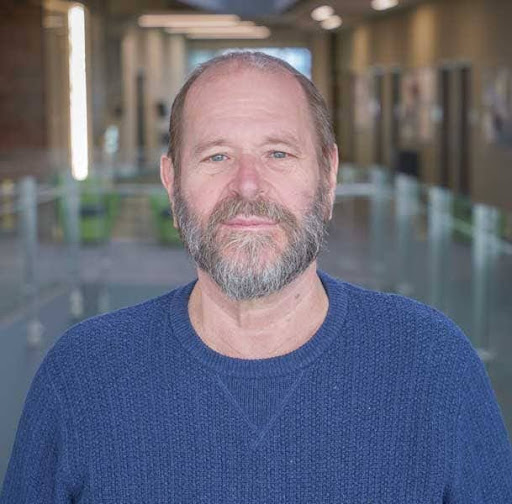
On Sept 10, 2024, Moravian lost esteemed mathematics professor Dr. Fred Schultheis. For almost 40 years, Schultheis shared his passion for mathematics with his students, teaching until his last days.
Schultheis joined the Moravian faculty in 1985, specializing in algebraic number theory, algebraic geometry, and the history of mathematics. Over the years, he taught most courses in the math department, but his favorites were always Modern Algebra, Differential Equations, and The History of Infinity.
A former student of his, Jennika Borger ‘98, now the university’s chaplain, remembers him fondly.
“Math was more than numbers and equations to Dr. Schultheis,” said Borger. “It was a lens through which he viewed the universe. Even when the equations on the chalkboard felt incomprehensible, his kindness and dedication always shone through. He taught us to look beyond the numbers and see the beauty in complexity.”
In his lectures, Schultheis often donned Hawaiian shirts, cargo shorts, and sandals, creating an approachable and intellectually challenging classroom atmosphere. But, despite the level of difficulty of his courses, students remember his patience and dedication to teaching.
“He knew what he was teaching was hard,” said physics and math major Liam Reinert ‘25. “He was very patient and took a lot of time to make sure everyone was able to get up to speed in The History of Infinity.”
Students recall his ability to push them to see mathematics in new and creative ways.

“There was something special about the way [Dr. Schultheis] could take a problem that none of us knew how to start and work through its complexities to arrive at an elegant solution,” said mathematics major Geoffrey Kleinburg ‘25, another former student and research collaborator. “Dr. Schultheis not only taught me how to do math but also how to love doing math by seeing its depth and purity.”
Schultheis helped countless students study for The William Lowell Putnam Mathematical Competition, also known as the Putnam exam, a challenging, six-hour mathematics exam for undergraduate students. Some of these students include Reinert and Kleinburg.
Kleinburg’s best memories of Schultheis were from their study sessions, where they worked side-by-side to solve new, demanding problems.
“He challenged me to look at problems in new ways, showing by his creativity that even the hardest problems can have beautiful solutions,” said Kleinburg.
Outside of the classroom, Schultheis was instrumental in further developing the university’s mathematics department. He received start-up funding to establish the department’s colloquium series, which brought students and faculty together to explore advanced mathematical topics. Schultheis also notably received funding for The U.S. National Science Foundation Research Experiences for Undergraduates (NSF REU) program in the late 80’s.
“An impressive grant that was able to support undergraduate research in a time when it was not valued as it is today,” said Nathan Shank, professor of mathematics.
The lessons Schultheis taught extended far beyond the classroom environment, with students recalling his talents in gardening and music. His garden was popular in his Bethlehem neighborhood, and he was known to gift neighbors with homegrown vegetables, especially his famous cucumbers (which turned into great pickles) and tomatoes. His bread, baked almost daily, was shared just as generously.
A man of many devotions, Schultheis was a talented guitar and bass player who in the early 2000s played with other Moravian professors in a band called Lethal Combination, with Kelly Krieble (physics) on drums and Bob Brill (psychology) on vocals. In class, he made comparisons between complex mathematical concepts and music anytime he could manage.
“He was my favorite professor, mostly because he loved the material so much,” Reinert said. “In History of Infinity and during Putnam practice, he would just light up when we solved a problem.”
Pure mathematics major Tori Harper ‘25 described Schultheis as a great adviser to Moravian’s Mathematics Society.
“He had a truly special way of perceiving the world around us,” Harper said. “It was apparent that he truly dedicated his life to what he loved.”
Schultheis was much more than a math professor; he taught lessons that a textbook could never cover.
When he was a student under Schultheis, Erik Csikos, now an associate professor of practice in the Mathematics Department, fondly remembers going to his office hours to ask questions.
“The great thing about it was that he would often start talking about whatever topic was on his mind, whether it related to my original question or not,” Csikos recalls. “Listening to him during those office hour sessions was like getting a whole other education.”
“It didn’t matter if I was in one of his classes or not, if he had time during his office hours and I showed up, he’d start talking for as long as I sat there or until he ran out of time.”
Schultheis earned his Bachelor’s degree from Moravian College, his Master’s from Purdue University, and his Ph.D. in mathematics from the University of Michigan, ultimately returning to Bethlehem to teach at his alma mater.
His love for University of Michigan football was well-known, and on Saturdays, you could find him in full Michigan gear, watching the Wolverines take on their rivals. His family, his wife Cathleen, their children Eric, John, James, and Caitlin, and his extended family, were the center of his world.
Through his wife’s family, he became a member at St. Bernard’s: Home of the Good Samaritans, a social and beneficial club in Bethlehem. Throughout his adult life, he devoted time to helping in any way he could, either by holding a board position, helping with the books, or bartending.
When Borger reflects on his legacy at Moravian, she’s reminded of a quote from the book Infinity: The Quest to Think the Unthinkable. The idea of infinity is at the heart of Schultheis’ legacy at Moravian, she says, and it lives on in his students, community, and faculty that held him in such high esteem.







